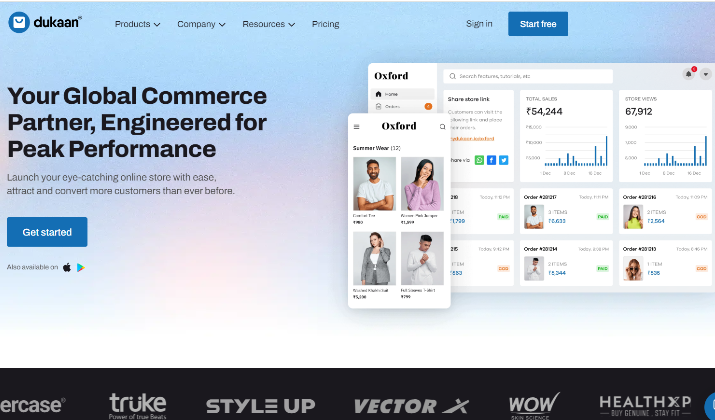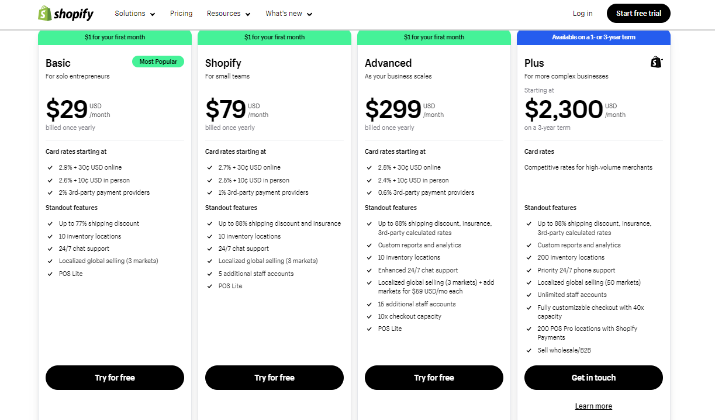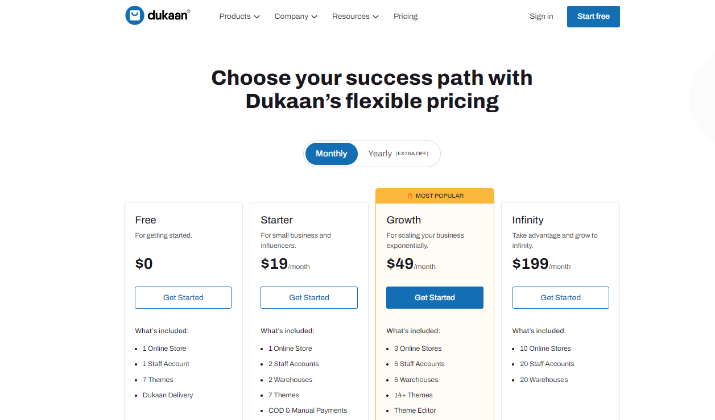As an entrepreneur or online retailer, you may find yourself pondering the age-old question: which ecommerce platform should I choose to sell my products?
This article is going to focus on Shopify and Dukaan.
While Shopify is a prominent player in the ecommerce domain, Dukaan is relatively a new platform but has grown into a solid ecommerce solution in the recent times.
But which one truly reigns supreme when it comes to selling online?
Let’s delve into the heart of this debate and uncover the answer.
Overview
Shopify
Shopify, a global ecommerce platform, offers a comprehensive solution for businesses of all sizes.
It enables users to build online stores, manage sales, market to customers, and accept payments across digital and physical locations.
It offers a comprehensive set of features, including:
- Customizable themes
- AI tools
- Access to mobile shoppers
- A high-converting checkout process
- The ability to use a custom domain
Shopify allows users to sell physical and digital products, services, gift cards, and offers tools for point of sale, social storefronts, and drop-shipping.
Additionally, Shopify provides a cloud-based solution with templates, an easy builder, and various customizable tools to cater to different business needs.
The platform is popular among small businesses, SMEs, and major brands worldwide, with over 15,000 major brands using Shopify Plus for enterprise-level operations.
Shopify’s flexibility allows for easy customization through themes, custom apps, and APIs, empowering users to create rich online experiences without compromising on ease of use.
This makes Shopify a popular choice for businesses seeking to scale their operations globally.
Also read: Shopify vs Flipkart
Try Shopify free followed by first month at just $1. No credit card required. Limited Time Offer.
Dukaan
Dukaan is a newer player in the Indian market, focusing on simplicity and ease of use.
Catering to entrepreneurs and startups who are new to the world of ecommerce, Dukaan takes a mobile-first approach, recognizing the growing importance of mobile devices in online shopping.
It provides tools for product customization, inventory management, and SEO optimization, making it easy to enhance brand value and maximize ROI.
Dukaan supports various industries beyond physical goods, including services, memberships, and ticketing, with features like drop-shipping available in select regions.
Dukaan stands out for its speed, user-friendly interface, and comprehensive features like abandoned cart recovery, auto sales tax calculator, and multiple payment gateway integration.
It offers a well-designed theme library, customizable templates, and easy product uploading, making it convenient for sellers to set up and manage their online stores without the need for coding knowledge.
This emphasis on user-friendly design and accessibility has made Dukaan an attractive option for businesses looking to establish their online presence in the Indian market.
While Shopify is a well-established player in the global ecommerce industry, Dukaan has carved out a niche for itself in the Indian market, catering to the unique needs and preferences of local entrepreneurs and startups.
Check out: Sellfy vs Printful
Ease of Use
Shopify
Shopify’s interface is modern and user-friendly, streamlining the process of product management and inventory control.
However, Shopify’s extensive features can result in a steeper learning curve compared to Dukaan’s more straightforward solution.
Shopify’s more complex interface is better suited for businesses with more advanced needs, as it offers a robust set of features and functionalities to support their growth and scale.
Try Shopify free followed by first month at just $1. No credit card required. Limited Time Offer.
Dukaan
Dukaan’s simpler interface makes it slightly more beginner-friendly, as users can navigate the platform with minimal effort.
For established businesses looking to enter the ecommerce space or expand their online presence, Dukaan’s intuitive design and hassle-free approach can be a suitable choice.
Its mobile-first focus and easy-to-use features cater to entrepreneurs and startups who prioritize simplicity over advanced functionality.
Explore: Sellfy vs Etsy
Customer Support & Resources
When it comes to customer support and resources, Shopify emerges as the more comprehensive platform.
Shopify offers an extensive range of customer support options, including phone, email, and live chat, ensuring that you can reach out to their team for assistance whenever needed.
Additionally, Shopify provides a wealth of online resources, such as a robust knowledge base, tutorials, and community forums, to help you navigate the platform and troubleshoot any issues that may arise.
On the other side, Dukaan primarily provides customer support through live chat, with limited access to other communication channels. However, Dukaan also offers 24/7 support, primarily catered to through its mobile app.
While Dukaan’s support may be more streamlined, Shopify’s more comprehensive and multi-faceted approach to customer assistance and resources could be a significant advantage for businesses seeking a higher level of ongoing support.
This could be a crucial factor for businesses that require more hands-on guidance or prefer to have multiple avenues for resolving any challenges they may face while using the platform.
Read this too: Sellfy Review, Pros And Cons
Pricing & Plans
Shopify
The pricing plans from Shopify are as follows:
- Basic Plan: Priced at $39 per month (or $29 per month if billed annually), this plan is ideal for new ecommerce businesses, offering essential features for starting an online store.
- Shopify Plan: This plan is priced at $105 per month (or $79 per month if paid annually). It is suitable for growing businesses that sell online, providing more advanced features compared to the Basic Plan.
- Advanced Plan: Priced at $399 per month (or $299 if billed yearly), this plan has been designed for fast-growing businesses in need of advanced reporting tools and features.
- Plus Plan: This plan is priced at $2300 per month. It is geared towards enterprise-level businesses with bespoke platforms, offering premium features and services for high-volume merchants.
These plans cater to different business needs, from startups to large enterprises, with varying levels of features, support, and pricing.
Each plan has its unique offerings, allowing businesses to select the one that best aligns with their requirements and growth stage.
Explore: Shopify vs Meesho
Try Shopify free followed by first month at just $1. No credit card required. Limited Time Offer.
Dukaan
Dukaan offers several pricing plans to cater to businesses of different sizes and needs:
- Free Plan: This plan that comes with zero subscription fees offers essential features for starting an online store.
- Starter Plan: Priced at $19 per month of $199 yearly, this plan comes with enhanced capabilities and flexibility for small businesses.
- Growth Plan: This plan is priced at $49 per month or $499 per year. It is intended for businesses looking to scale exponentially. It includes everything in the Starter Plan plus custom themes and 3rd-party integrations, access to over 20 additional plugins and vendor management dashboard for multi-vendor setups.
- Infinity Plan: Priced at $199 per month or $1999 yearly, this plan has been designed for large-scale direct-to-consumer (D2C) enterprises with unique needs. It offers custom themes, 3rd-party integrations, additional plugins, B2B/B2C marketplace, vendor management dashboard, and more.
Read this too: Shopify vs Shopee
Customization & Design Options
Shopify boasts a wide range of both free and paid themes and templates, all featuring a modern and responsive design across multiple devices.
Shopify’s powerful theme editor allows you to extensively customize the look and feel of your online store, as well as manage your content with ease.
Dukaan provides customizable templates and a user-friendly interface that enables you to adjust colors, fonts, and layouts without any coding knowledge.
Shopify’s theme selection and customization flexibility are more extensive than Dukaan’s, empowering you to create a more personalized and visually appealing online presence for your business.
However, while Dukaan’s customization options are more limited compared to Shopify, its templates are specifically designed to be intuitive and easy to customize, making them a suitable choice for businesses with limited technical expertise.
Also read: Ecwid vs Prestashop
Product Management & Inventory
Shopify’s advanced features, such as comprehensive inventory management, detailed product tracking, and intuitive product grouping, make it an exceptional choice for businesses looking to scale their operations.
In contrast, while Dukaan offers a user-friendly and centralized product management system, it lacks the robust functionality and flexibility of Shopify’s offerings.
Shopify’s product management capabilities are truly comprehensive, allowing you to fine-tune your product listings, organize products into collections, and manage inventory across multiple locations.
The level of control and visibility is crucial for businesses that need to handle high-volume sales and complex product management requirements.
Dukaan’s product management features, while satisfactory for smaller businesses or those just starting their ecommerce journey, fall short of the advanced capabilities found in Shopify.
If your business has more complex product management needs, such as the need for detailed inventory tracking or the ability to handle a large product catalog, Shopify’s superior product management tools make it the more suitable choice.
Read this too: Sellfy vs Podia
Marketing & SEO Tools
Shopify offers a robust suite of marketing tools, including the ability to run email campaigns, implement referral programs, and leverage comprehensive SEO features that help businesses optimize their content for search engines.
Dukaan provides more basic marketing tools, such as discount code generation and referral codes, with limited SEO functionality.
Shopify’s marketing and SEO tools are more advanced and versatile than Dukaan’s, enabling businesses to set up effective campaigns and improve their online visibility.
Furthermore, Shopify’s built-in SEO tools and marketing features are a significant advantage over Dukaan’s more limited offerings in this area.
This makes Shopify a better choice for businesses that prioritize digital marketing and search engine optimization, as they will have access to a more comprehensive set of tools to drive traffic and boost their online presence.
Also read: Shopify vs Wix
Conclusion
Shopify emerges as the more robust and comprehensive ecommerce solution, offering a wealth of advanced features, extensive customization options, and unparalleled scalability.
Shopify is an excellent choice for businesses with global ambitions or those requiring a multitude of functionalities to support their growth.
Whereas Dukaan presents itself as a more user-friendly and cost-effective platform, particularly appealing to startups, small businesses, and entrepreneurs in the Indian market.
Dukaan’s focus on simplicity and ease of use make it an attractive option for those who prioritize a hassle-free online store setup and management over advanced capabilities.
By carefully evaluating your needs and aligning them with the strengths of each platform, you can make an informed choice that will best support your ecommerce success.















